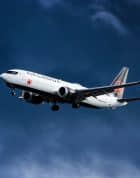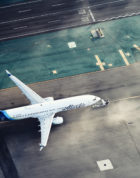You’ve maybe seen its ubiquitous ads on Facebook, selling cheap airfares to São Paulo and Punta Cana, but prior to today, you probably haven’t heard much about Arajet.
Given this low profile, you may be surprised to hear that Arajet has been flying to Canada for a year now, offering affordable airfares to Latin America and the Caribbean.
In this guide, let’s tackle what you need to know about this promising “low-price” carrier from the Dominican Republic.
In This Post
- About Arajet
- Arajet’s Routes and Network
- Arajet’s Fleet and Seats
- Arajet’s Ground and In-Flight Experience
- Pricing of Arajet Flights
- Booking Arajet Flights with Points
- Conclusion
About Arajet
Founded in 2022, Arajet, which bills itself as a “low-price” carrier, serves as the flag carrier of the Dominican Republic with its 10 Boeing 737 MAX 8 aircraft.
While flying people to the Dominican Republic is one of the airline’s key focuses, Arajet also receives significant business from connecting the Americas and the Caribbean with its one-stop flights.
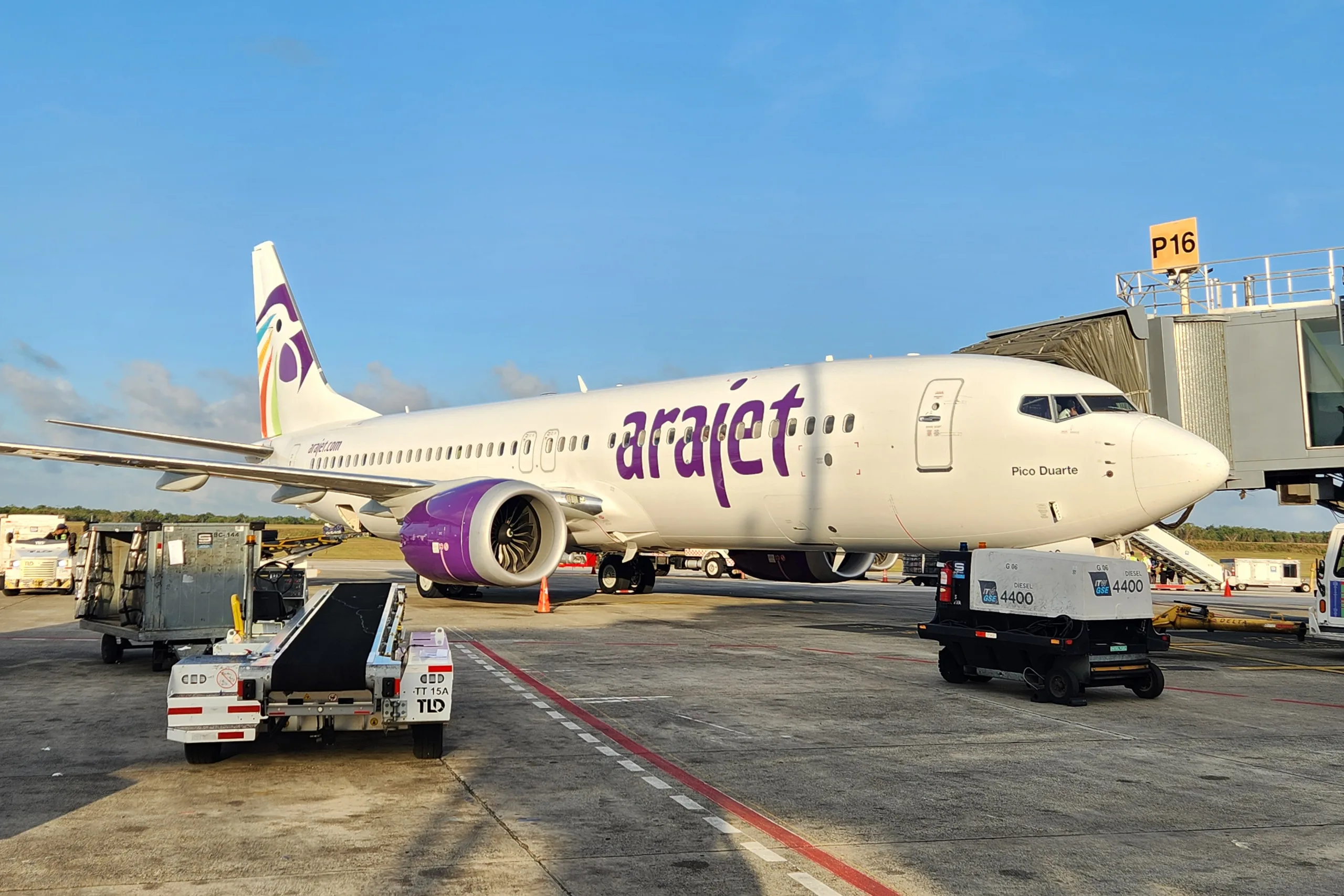
Arajet doesn’t currently have the scale of other pan-American carriers like LATAM Airlines and Avianca, but it connects the Americas and the Caribbean remarkably well, with routes spanning from Canada in the north to Chile in the south, despite its relatively small fleet.
Arajet has been flying to Canada for a year now, with its flights to Toronto (YYZ) commencing in October 2023 and flights to Montreal (YUL) beginning in November 2023.
Initially, the airline has been connecting these cities to Santo Domingo (SDQ) and beyond, but by the end of October 2024, it will be operating flights between these two Canadian cities and Punta Cana (PUJ) instead.
By making this change, the airline can effectively serve those wanting a tropical vacation, as well as those venturing further afield in Latin America and the Caribbean.
Arajet’s Routes and Network
From the outset, Arajet’s intention was to build a pan-American hub out of Santo Domingo (SDQ) – similarly to what one of its rivals, Copa Airlines, has done in Panama City (PTY).
However, beginning this 2024/25 IATA winter schedule, Arajet has recalibrated its strategy, realigning its network to transfer its main hub to Punta Cana (PUJ) while still maintaining a smaller hub in Santo Domingo.
Seemingly, this strategy allows them to capture not only connecting passengers but also those intending to visit Punta Cana, which is more popular as a beach destination than Santo Domingo, the capital city.
Thus, at the end of October 2024, which is the start of the airline’s winter timetable, Arajet will be flying between Punta Cana and Toronto (YYZ) five times weekly (eventually increasing to daily flights), while its services between Punta Cana and Montreal (YUL) will be operated five times weekly (eventually increasing to six times weekly).
Services to Santo Domingo from both Canadian cities will henceforth be cancelled, and those intending to visit the Dominican capital can now instead book a bus service from Punta Cana as part of their air ticket.
From Punta Cana, passengers from Toronto and Montreal can connect to a host of destinations in Latin America and the Caribbean, including the following:
- Argentina: Buenos Aires (EZE)
- Brazil: São Paulo (GRU)
- Chile: Santiago (SCL)
- Colombia: Bogotá (BOG), Cartagena (CTG), and Medellin (MDE)
- Ecuador: Quito (UIO)
- Jamaica: Kingston (KIN)
- Mexico: Mexico City (NLU) and Cancun (CUN)
- Peru: Lima (LIM)
As of this writing, tickets departing until October 2025 or a year in advance are already available through the Arajet website.
Arajet’s Fleet and Seats
Currently, Arajet operates a fleet of 10 Boeing 737 MAX 8 aircraft, the majority of which are less than three years old according to Airfleets.net.
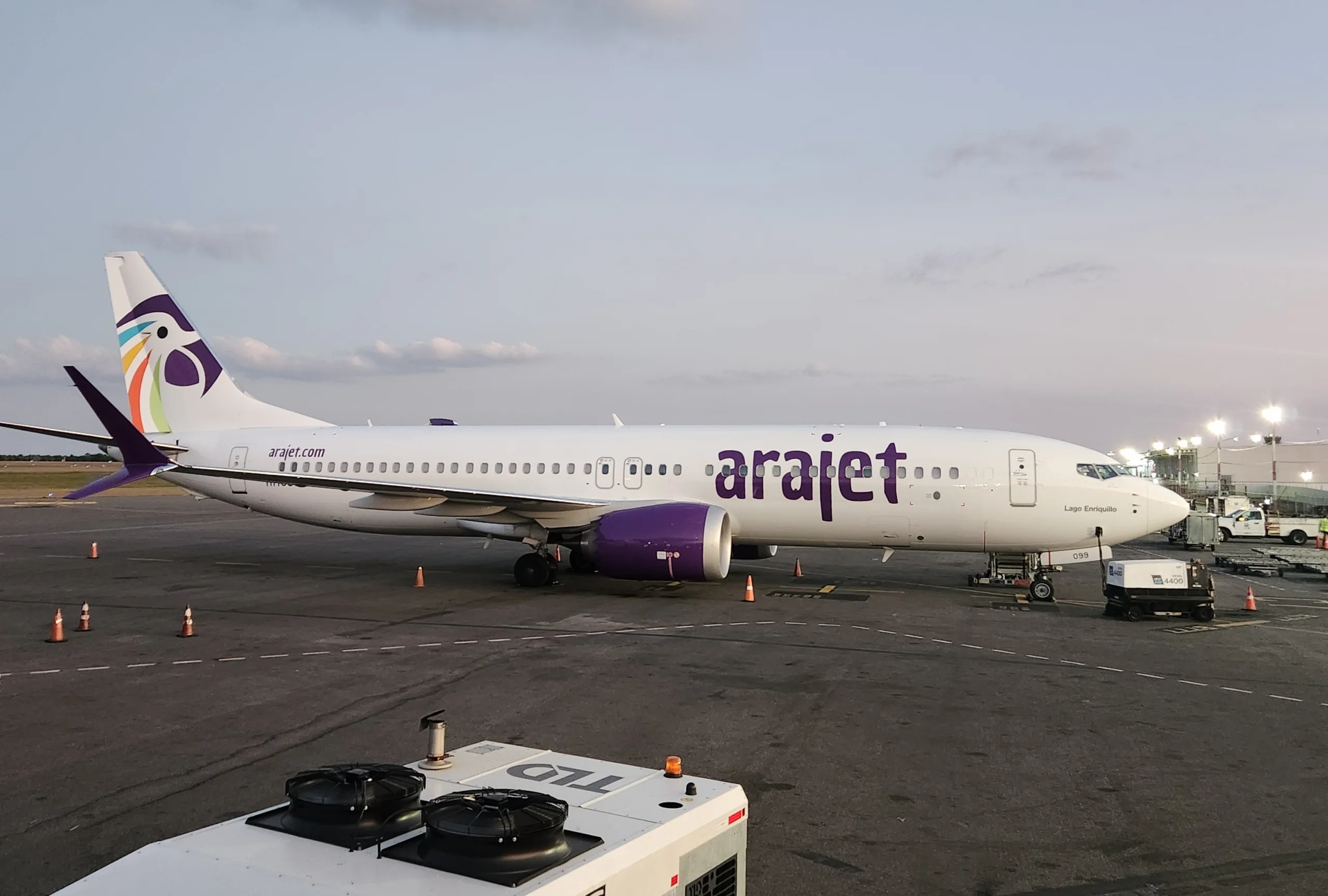
Operating an all-MAX 8 fleet allows Arajet the flexibility to fly both short or long distances. With the maximum range of the MAX 8 at 3,500 nautical miles, the airline is able to fly between the Dominican Republic and cities as far as São Paulo (GRU), Santiago de Chile (SCL), and Buenos Aires (EZE), with these flights lasting eight hours on average.
Inside the aircraft are slimline seats laid out in mostly a 3-3 configuration with a pitch of 30” and a recline of up to 2”, which is in line with what’s offered by many low-cost carriers around the world.
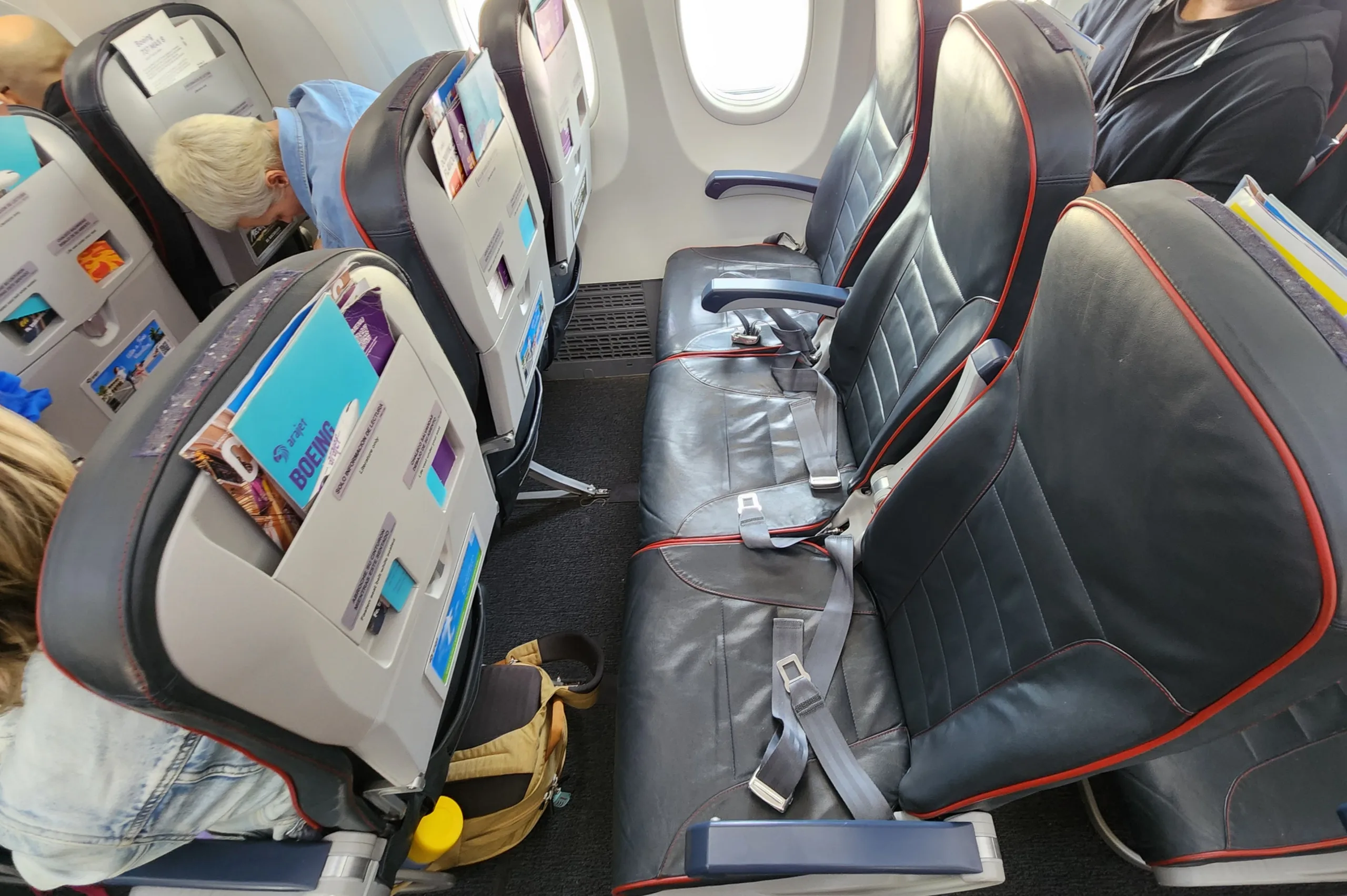
The first two rows on each aircraft are an exception, however, since these recliner seats, marketed as “Premium,” are arranged in a 2-2 configuration, similar to the narrowbody business class offering of other airlines.
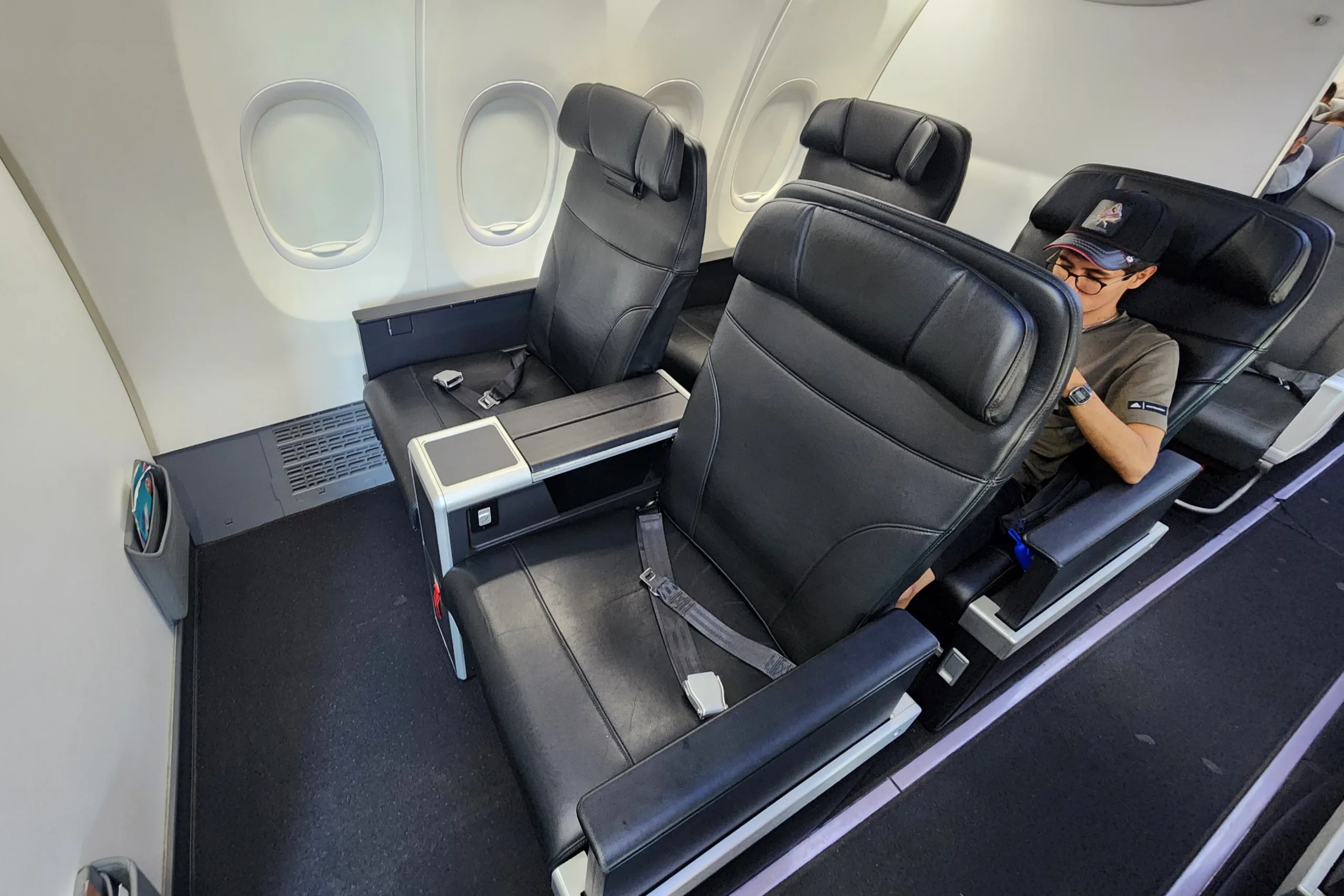
Owing to the MAX 8’s longer fuselage, Arajet gets to equip its aircraft with eight Premium seats in the first two rows, plus 177 regular economy seats in the next 30 rows.
Arajet’s Ground and In-Flight Experience
As expected from a low-cost carrier, Arajet offers services to a lesser extent compared to full-service or legacy carriers.
At the airport, checking in with Arajet staff comes at a fee, which you can pay at the time of booking or at the airport. To avoid this fee, passengers must check in online.
In-flight service is conducted by Arajet’s friendly Dominican staff in both Spanish and English.
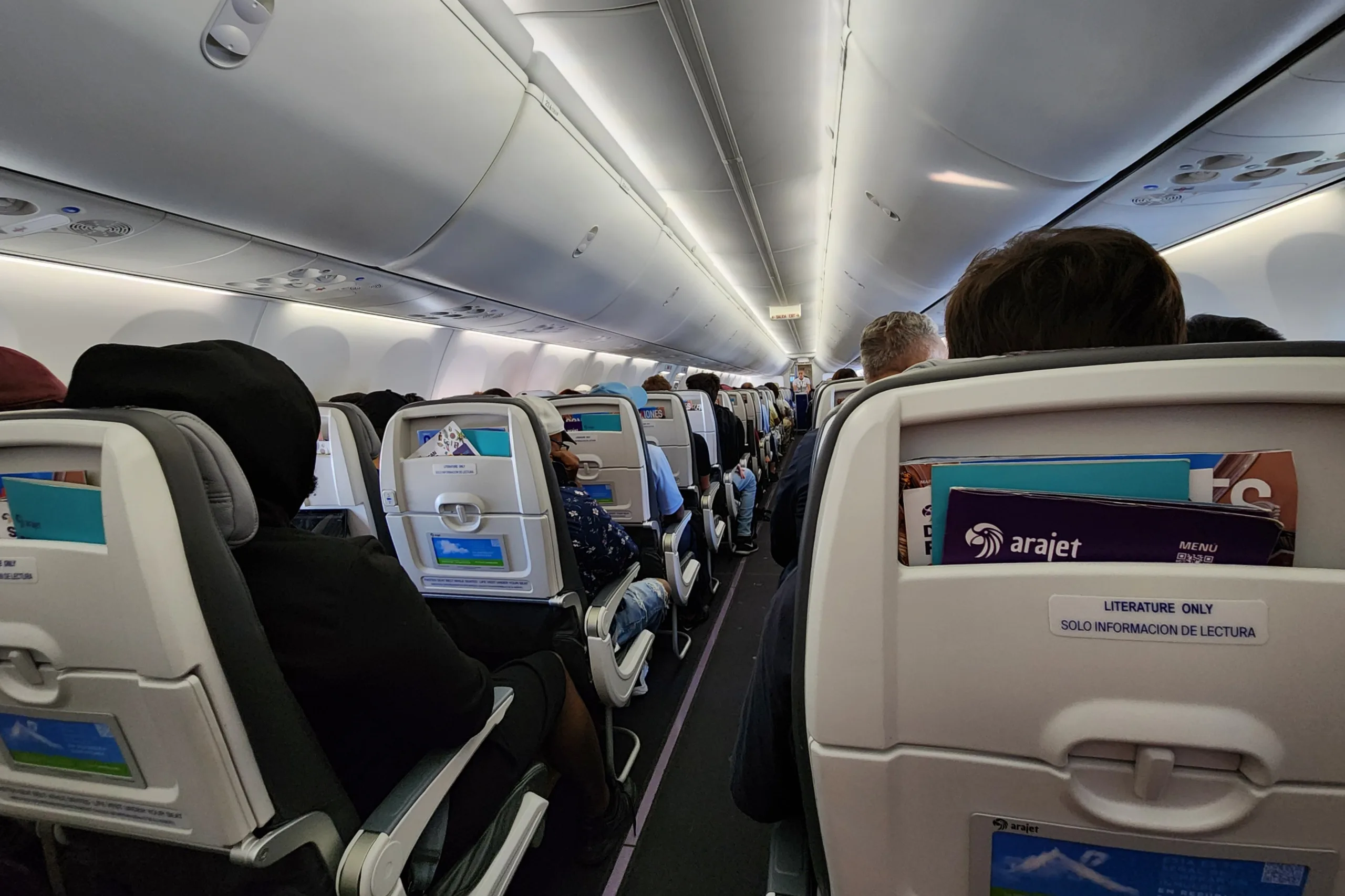
Again, as expected from a low-cost carrier, all onboard food and drinks must be paid for, even water, which is sold at $2 (USD) a bottle. With sandwiches going for as much as $7 (USD), it’s in your best interest to fill yourself up at an airport lounge, which you can enter for free with select credit cards.
Lastly, there’s no entertainment or Wi-Fi onboard Arajet’s flights, so plan to bring books or downloaded movies with you for those 13-hour journies to South America.
For connecting flights, Arajet schedules only a short layover, but thanks to the efficiency of its operations and the simplicity of the airports in the Dominican Republic, passengers get to their connections without a hitch.
Arajet receives so many transfer passengers that it has seemingly adapted its operations to cater to them, with staff helping them through their connection.
Pricing of Arajet Flights
Uncharacteristic of low-cost carriers, Arajet operates on a “hub-and-spoke” model that allows for connections at its Dominican hubs. The airline’s flights are thus priced based on the origin and final destination, rather than the cumulative sum of each flight segment’s cost.
To illustrate simply, you can book Toronto (YYZ) to Punta Cana (PUJ) or São Paulo (GRU) on the same date with a small difference in price, despite the fact that flying to Brazil adds another seven-hour flight.
However, unlike legacy carriers, Arajet’s flights cost the same whether booked as round-trips or as two one-ways, meaning that you won’t get charged more for booking one-way tickets like you would with most legacy carriers.
This allows you to book open-jaw routings, or simply one-way tickets, which you may need as positioning flights for award tickets.
Out of Toronto and Montreal, Arajet is often the cheapest option on the routes and connections it serves. With Arajet’s frequent promotions, it’s possible to find the following one-way fares when booked in advance:
- Toronto to Cartagena: $107 (USD)
- Toronto to Buenos Aires: $178 (USD)
- Montreal to Punta Cana: $165 (USD)
- Medellin to Montreal: $160 (USD)
- São Paulo to Toronto: $130 (USD)
However, when booking Arajet flights, always bear in mind that the barebones “Smart” fares don’t include a carry-on or checked bag, and also don’t include seat selection. If you’d like to include luggage or more amenities, like seat selection, you can buy them à-la-carte or choose the “Comfort” or “Extra” bundles.
When purchased separately, carry-on and checked bag pricing varies depending on when they’re booked and paid for. Unsurprisingly, the cheapest time to pay for these add-ons is during booking as the cost increases as the flight nears and is even more expensive if you add them at the airport.
As for seating, Premium seats, which as mentioned above are similar to the domestic business class seats of other airlines, are sold for a modest price. For example, for a flight between Toronto and Punta Cana, you can enjoy the extra room of the first two rows for as low as $75 (USD).
Meanwhile, the cost to select a non-Premium seat ranges from $15 to $65 (USD) depending on the route and which part of the aircraft you’d like to sit in.
As a final note on pricing, when booking through the Arajet website, you should always choose to pay in US dollars, even if your card charges an extra 2.5% as a foreign transaction fee.
Converting the cost to another currency, such as Canadian dollars, will end up costing you way more, since Arajet’s payment system seemingly imposes a dynamic currency conversion (DCC) scheme.
Booking Arajet Flights with Points
Understandably, as a low-cost carrier, Arajet doesn’t have a loyalty program. Therefore, if you’re intent on booking Arajet flights on points, you’ll have to look to fixed-value credit card points currencies, which can offset the cost of your flights – taxes and fees included.
As mentioned above, the best way to purchase airfares through the Arajet website is by paying in US dollars. Given this, there are two credit cards that immediately come to mind as excellent choices: the Scotiabank Passport® Visa Infinite* Card and the Scotiabank Gold American Express® Card.
- Earn 25,000 Scene+ points upon spending $1,000 in the first three months
- Plus, earn an additional 20,000 Scene+ points upon spending $7,500 in the first year
- Earn 6x Scene+ points at Sobeys, IGA, Safeway, FreshCo, and more
- Plus, earn 5x Scene+ points on groceries, dining, and entertainment
- Also, earn 3x Scene+ points on gas, transit, and select streaming services
- Redeem points for a statement credit for any travel expense
- No foreign transaction fees
- Enjoy the exclusive benefits of being an American Express cardholder
- Annual fee: $120 (waived for the first year)
Both of these cards don’t levy foreign transaction fees, saving you 2.5% right off the bat, and more importantly, both cards earn Scene+ points that you can redeem against any travel purchase, including Arajet airfares.
With Scene+, you can redeem against eligible travel purchases at 1 cent per point, which means that a $200 (CAD) airfare will cost you 20,000 Scene+ points.
- Earn 25,000 Scene+ points upon spending $1,000 in the first three months
- Earn an additional 10,000 Scene+ points upon spending $40,000 in the first year
- Earn 2x Scene+ points on groceries, dining, entertainment, and transit
- Plus, earn 3x Scene+ points on grocery purchases at Sobeys, IGA, Safeway, and FreshCo
- Visa Airport Companion membership with six free lounge visits per year
- Redeem points for statement credit for any travel expense
- Minimum income: $60,000 personal or $100,000 household
- Annual fee: $150
As alternatives to the two cards from Scotiabank, you can also look at using the TD First Class Travel® Visa Infinite* Card or the CIBC Aventura® Visa Infinite* Card.
With the TD First Class Travel® Visa Infinite* Card, you can charge your Arajet fare and redeem your TD Rewards points at a rate of 0.4 cents per point, and your trip will be backed by the card’s strong travel insurance coverage.
- Earn 20,000 TD Rewards Points upon making your first purchase†
- Earn 115,000 TD Rewards Points upon spending $5,000 within 180 days of account opening†
- Plus, earn up to 10,000 TD Rewards Points back on your birthday†
- Plus, earn 8x TD Rewards Points† on eligible travel purchases when you book through Expedia® for TD†
- Get an annual TD Travel Credit† of $100 when you book through Expedia® for TD†
- Use your rewards for any travel bookings available on Expedia® for TD†
- Minimum income: $60,000 personal or $100,000 household
- Annual fee: $139, rebated for the first year†
- Application must be approved by January 6, 2025 to receive this offer
On the other hand, with the CIBC Aventura® Visa Infinite* Card, you can redeem your CIBC Aventura Points for your Arajet flights at 1 cent per point. Plus, the card’s four free lounge passes through DragonPass will surely come in handy to make your pre-flight experience more comfortable.
- Earn 15,000 CIBC Aventura Points after making your first purchase†
- Plus, earn 30,000 CIBC Aventura Points after spending $3,000 in the first four monthly statement periods†
- Plus, earn 2x CIBC Aventura Points on all purchases through the CIBC Rewards Centre†
- Plus, earn 1.5x CIBC Aventura Points on eligible gas, groceries, EV charging, and drugstore purchases†
- Four free lounge visits per year with the Visa Airport Companion Program†
- NEXUS application fee credit†
- Minimum income: $60,000 personal or $100,000 household†
- Annual fee: $139 (rebated for the first year)†
Conclusion
For a year now, Arajet, a “low-price” carrier based in the Dominican Republic, has been flying to Toronto (YYZ) and Montreal (YUL), offering affordable fares to Latin America and the Caribbean.
Given how little has been written about Arajet from a Canadian perspective, we hope our guide has helped fill in your knowledge, and that it helps you decide whether or not you should book your next trip with this promising new carrier.























